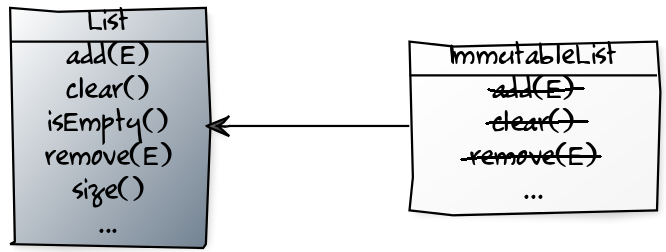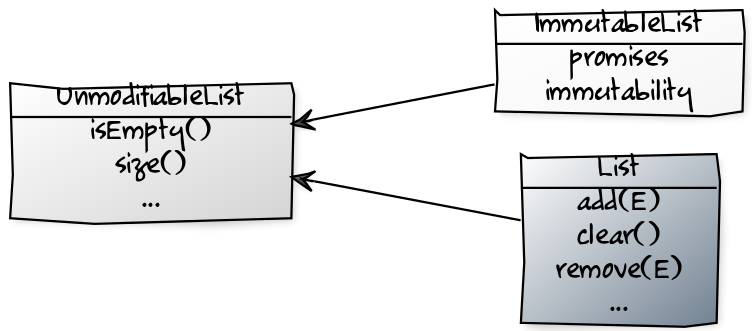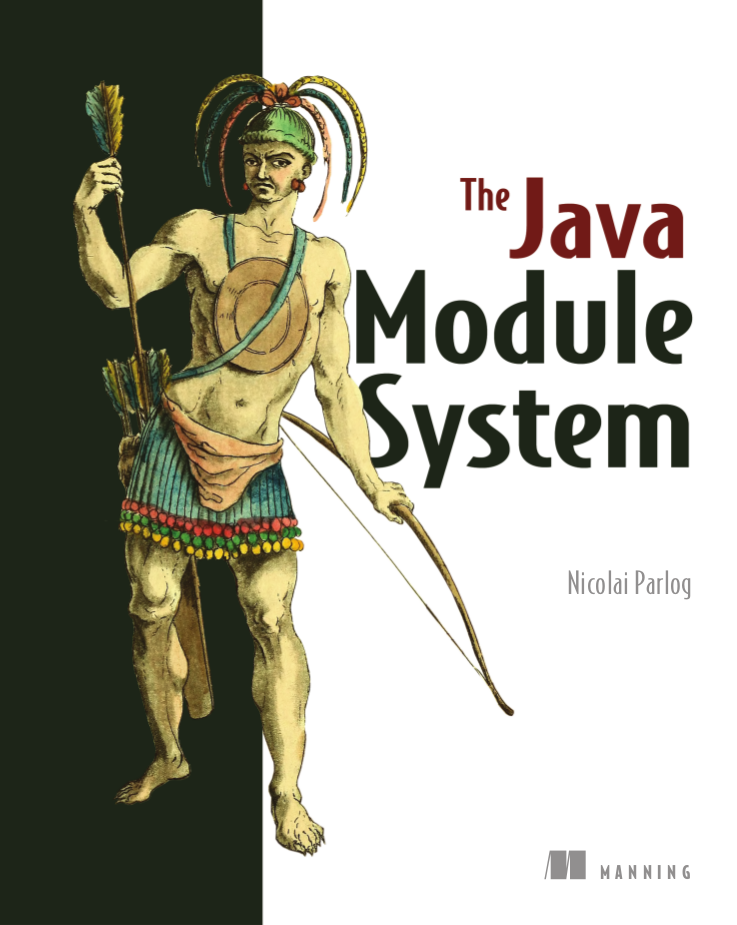record Customer(String name) {
// no accessor
private final String id;
// [...]
}Why Don’t They Just… ?!
Why don’t they just…
| ... Let Us Add Fields To Records?! |
| ... Let Streams Handle Checked Exceptions?! |
| ... Introduce Immutable Collections?! |
... Introduce ?. For null-safe Member Selection?! |
| ... Introduce Nullable Types?! |
Slides at slides.nipafx.dev/just
Why don’t they just…
| ... Let Us Add Fields To Records?! |
| ... Let Streams Handle Checked Exceptions?! |
| ... Introduce Immutable Collections?! |
... Introduce ?. For null-safe Member Selection?! |
| ... Introduce Nullable Types?! |
What We Want
Being able to add fields to records:
Why Do We Want That?
To benefit from encapsulation and
boilerplate reduction?
The thing is:
Records are about neither.
Record Semantics
Restrictions
Transparency implies restrictions:
an accessor for each component
(or the API doesn’t model the state)an accessible constructor with
one parameter per component
(or the API doesn’t model the state)no additional fields
(or the API doesn’t model the whole state)no class inheritance
(or the API doesn’t model the whole state)
Ok, But Why?
Records were designed to be nominal tuples:
nominal means they have names
(as all types in Java do)tuples are a mathematical concept
(pairs, triples, etc. are tuples)
For a type to be a tuple,
it must conform to the restrictions.
Ok, But Why?!
If records are tuples,
their deconstruction becomes:
easy
lossless
⇝ We can do a few cool things!
Destructuring
JEP 405 proposes record patterns
that deconstruct records:
if (range instanceof Range(int low, int high)
&& high < low)
return new Range(high, low);Transparency ⇝ no hidden state was lost.
With Blocks
Future Java may (!) introduce with blocks:
Range range = new Range(5, 10);
// SYNTAX IS MADE UP!
Range newRange = range with {
low = 0;
};
// range: [5; 10]
// newRange: [0; 10]Transparency ⇝ no hidden state was lost.
Serialization
Transparency makes record (de)serialization:
easier to implement and maintain in JDK
easier to use and maintain in your code
safer
faster
(More in Inside Java Podcast, episode 14.)
Summary
records want to be (nominal) tuples
that requires transparency
transparency requires no additional fields
transparency affords additional features
like destructuring,withblocks, better serialization
Higher-Level Summary
It makes sense to introduce someting that has restricions
if those restrictions enable other features.
Why don’t they just…
| ... Let Us Add Fields To Records?! |
| ... Let Streams Handle Checked Exceptions?! |
| ... Introduce Immutable Collections?! |
... Introduce ?. For null-safe Member Selection?! |
| ... Introduce Nullable Types?! |
What We Want
Streams that work well with checked exceptions:
int compute(String word) throws IOException;
int supercharge(int val) throws InterruptedException;
try {
List<Integer> supercharged = Stream
.of("foo", "bar")
.map(this::compute)
.map(this::supercharge)
.toList();
} catch (IOException | InterruptedException ex) {
// ...
}Let’s think this through
We need:
an exception throwing
Functionchanges to
Streammethods,
so they throw exceptions
Attempt #1
Let map throw Exception:
interface Function<IN, OUT> {
OUT apply(IN input) throws Exception;
}
interface Stream<E> {
<OUT> Stream<OUT> map(Function<E, OUT> f)
throws Exception;
List<E> toList();
}Attempt #1
That’s not correct:
streams are lazy
mapdoes not apply the functionthe terminal operation does
⇝ Terminal ops have to declare throws.
Attempt #2
Let terminal operation throw Exception:
interface Function<IN, OUT> {
OUT apply(IN input) throws Exception;
}
interface Stream<E> {
<OUT> Stream<OUT> map(Function<E, OUT> f)
List<E> toList() throws Exception;
}Attempt #2
try {
List<Integer> supercharged = Stream
.of("foo", "bar")
.map(this::compute)
.map(this::supercharge)
.toList();
} catch (Exception ex) {
// which exceptions?
}
List<Integer> supercharged = Stream
.of("foo", "bar")
.map(word -> word)
// compile error: unhandled exception
.toList();Attempt #2
That’s awful:
compiler doesn’t know exception type
we have to catch
Exceptionand
figure the rest out ourselveswe always have to catch
Exception
⇝ Need more specific type than Exception.
Attempt #3
Capture exception in generic parameter,
and let terminal operation throw that:
interface Function<IN, OUT, EX extends Exception> {
OUT apply(IN input) throws EX;
}
interface Stream<E, EX extends Exception> {
<OUT, F_EX extends Exception>
Stream<OUT, F_EX> map(Function<E, OUT, F_EX> f);
List<E> toList() throws EX;
}Attempt #3
try {
List<Integer> supercharged = Stream
.of("foo", "bar")
// ⇝ Stream<Integer, IOException>
.map(this::compute)
// ⇝ Stream<Integer, InterruptedException>
.map(this::supercharge)
.toList();
} catch (InterruptedException ex) {
// good
} catch (IOException ex) {
// isn't declared, so can't be caught
// ⇝ compile error
}Attempt #3
That’s not correct:
only last function’s exception type is captured
other checked exceptions can’t be caught
⇝ Need to capture all exception types.
Attempt #4
Merge exceptions in generic parameter,
and let terminal operation throw that:
static <
IN, OUT,
NEW_EX extends Exception,
STREAM_EX extends NEW_EX,
F_EX extends NEW_EX>
Stream<OUT, NEW_EX> map(
Stream<IN, STREAM_EX> stream,
Function<IN, OUT, F_EX> f) {
// ...
}Attempt #4
try {
List<Integer> supercharged = Stream
// ⇝ Stream<Integer, IOException>
.map(
// ⇝ Stream<Integer, FileNotFoundException>
Stream.map(
// ⇝ Stream<String, RuntimeException>
Stream.of("foo", "bar"),
this::throwsFileNotFoundException),
this::throwsZipException)
.toList();
} catch (IOException ex) {
// nice
}Attempt #4
try {
List<Integer> supercharged = Stream
// ⇝ Stream<Integer, Exception>
.map(
// ⇝ Stream<Integer, IOException>
Stream.map(
// ⇝ Stream<String, RuntimeException>
Stream.of("foo", "bar"),
this::compute),
this::supercharge)
.toList();
} catch (Exception ex) {
// argh!
}Attempt #4
That’s not good:
common case sucks:
Stream<SomeThing, RuntimeException>mapas static methods suckscatching
Exceptionsucks
(exceptions don’t generalize well)
⇝ Need to keep exception types distinct.
Attempt #5
Create multiple Stream interfaces
that differ by number of exceptions:
interface Stream<E> {
<OUT, F_EX extends Exception>
StreamEx1<OUT, F_EX>
map(Function<E, OUT, F_EX> f);
List<E> toList();
}Attempt #5
interface StreamEx1<E, EX extends Exception> {
<OUT, F_EX extends Exception>
StreamEx2<OUT, EX, F_EX>
map(Function<E, OUT, F_EX> f);
List<E> toList() throws EX;
}Attempt #5
interface StreamEx2<E,
EX0 extends Exception,
EX1 extends Exception> {
<OUT, F_EX extends Exception>
StreamExN<OUT> map(Function<E, OUT, F_EX> f);
List<E> toList() throws EX0, EX1;
}Attempt #5
interface StreamExN<E> {
<OUT, F_EX extends Exception>
StreamExN<OUT> map(Function<E, OUT, F_EX> f);
List<E> toList() throws Exception;
}Attempt #5
try {
List<Integer> supercharged = Stream
// ⇝ Stream<String>
.of("foo", "bar")
// ⇝ StreamEx1<Integer, IOException>
.map(this::compute)
// ⇝ StreamEx2<Integer, IOException,
// InterruptedException>
.map(this::supercharge)
.toList();
} catch (IOException ex) {
// good
} catch (InterruptedException ex) {
// great
}Attempt #5
That’s correct and usable!
(Which is a first.)
but it leads to many additional interfaces
together with primitive specializations
⇝ combinatorial explosion 💣²functions may declare multiple exceptions
⇝ need multiple overloads for all operations
⇝ combinatorial explosion 💣³
⇝ Need variadic generics.
Attempt #6
Put all exceptions into one type parameter:
interface Function<
IN, OUT, EXs... extends Exception> {
OUT apply(IN input) throws EXs;
}
interface Stream<E, EXs... extends Exception> {
<OUT, F_EXs... extends Exception>
Stream<OUT, EXs | F_EX>
map(Function<E, OUT, F_EXs> f);
List<E> toList() throws EXs;
}Attempt #6
try {
List<Integer> supercharged = Stream
// ⇝ Stream<String>
.of("foo", "bar")
// ⇝ Stream<Integer, IOException>
.map(this::compute)
// ⇝ Stream<Integer, IOException,
// InterruptedException>
.map(this::supercharge)
.toList();
} catch (InterruptedException ex) {
// good
} catch (IOException ex) {
// great
}Attempt #6
All around great with one downside:
Java doesn’t allow that
neither
FunctionnorStreamcompiles
😕
Attempt #7
Screw everything, just handle errors via return type:
List<Integer> supercharged = Stream
.of("foo", "bar")
// ⇝ Stream<Try<Integer>>
.map(this::compute)
// ⇝ Stream<Try<Integer>>
.map(this::supercharge)
.toList();Already works today.
More on that.
Summary
streams' laziness split in two:
passing a throwing function (intermediate op)
handling the exception (terminal op)
for classic try-catch:
needs generics to carry exception type(s) forward
there’s no good solution in today’s Java
but there are acceptable alternatives
Higher-Level Summary
It doesn’t make sense to introduce someting that:
has serious shortcomings in practice
prevents a much better solution down the road
particuarly if an acceptable alternative exists
Just because something isn’t perfect,
doesn’t mean every (partial) fix should be implemented.
Why don’t they just…
| ... Let Us Add Fields To Records?! |
| ... Let Streams Handle Checked Exceptions?! |
| ... Introduce Immutable Collections?! |
... Introduce ?. For null-safe Member Selection?! |
| ... Introduce Nullable Types?! |
What We Want
Immutable collections:
interfaces without mutating methods and
a guarantee that no mutations occur
As opposed to unmodifiable collections:
interfaces without mutating methods or
mutating methods that throw exceptions
Let’s think this through
(On the example of lists.)
Assume we had ImmutableList:
like
Listtodaybut without any mutation
⇝ How is it related to List?
ImmutableList super List

Good:
ImmutableListhas no mutating methods
ImmutableList super List
Bad:
List<Agent> agents = new ArrayList<>();
// compiles because `List` extends `ImmutableList`
ImmutableList<Agent> section4 = agents;
// prints nothing
section4.forEach(System.out::println);
// now lets mutate `section4`
agents.add(new Agent("Motoko"));
// prints "Motoko" - how did she get in here?!
section4.forEach(System.out::println);List super ImmutableList

Good:
ImmutableListisn’t extended
and thus actually immutable
List super ImmutableList
Bad:
ImmutableListhas mutating methods that throwImmutableListcan be passed asList
⇝ it’s reasonable to assume that mutation is allowed
⇝ runtime exceptions
Only really work well locally,
i.e. not across API boundaries.
Immutability as Absence
Easy to mistake immutability as an absence:
take a
Listremove mutating methods
profit
No!
That just gives you UnmodifiableList!
Immutability as a Feature
An UnmodifiableList offers no mutating methods,
without making immutability guarantees.
There are two things to add:
make it mutable by adding the according methods
make it immutable by adding the according guarantees
(Im)Mutability Clash
Immutability is not an absence of mutation, it’s a guarantee there won’t be mutation
(Im)mutability is inherited by subtypes!
If one of two types extends the other,
one of them contains both properties.
⇝ 💣
How to make this work
Solution:
don’t make the two lists inherit one another
instead, have a new supertype for both

In Practice
interface SecretService {
void payAgents(UnmodifiableList<Agent> agents);
void sendOnMission(ImmutableList<Agent> agents);
void downtime(List<Agent> agents);
UnmodifiableList<Agent> teamRoster();
ImmutableList<Agent> teamOnMission();
List<Agent> team();
}In Practice
But such code already exists
and often looks like this:
interface SecretService {
void payAgents(List<Agent> agents);
void sendOnMission(List<Agent> agents);
void downtime(List<Agent> agents);
List<Agent> teamRoster();
List<Agent> teamOnMission();
List<Agent> team();
}Retrofit new hierarchy
To benefit from new types,
we need to use them (duh!), but:
ListtoImmutableList
is source-incompatible ⇝ rewritereturn type
ListtoUnmodifiableList
is source-incompatible ⇝ rewriteparameter type
ListtoUnmodifiableList
is bytecode-incompatible ⇝ recompile
Imagine this for the JDK,
all libraries, frameworks, and your code!
Retrofit new hierarchy
Alternative:
duplicate existing methods
with a new name and new typesdeprecate old variants
Huge task that takes forever!
Summary
immutable collection types are a great thing to have
proper implementations of
ListandImmutableList
can never extend one anotherthis complicates their introduction into existing APIs
requires rewriting and recompiling code
across the entire Java ecosystem
Higher-Level Summary
It doesn’t make sense to introduce someting that:
requires rewriting/recompiling the world
splits the ecosystem into old and new
for incremental benefits
Just because something would be nice to have
doesn’t mean it’s nice to get.
Why don’t they just…
| ... Let Us Add Fields To Records?! |
| ... Let Streams Handle Checked Exceptions?! |
| ... Introduce Immutable Collections?! |
... Introduce ?. For null-safe Member Selection?! |
| ... Introduce Nullable Types?! |
What We Want
The ability to easily chain method calls
on possibly null instances:
// argh!
String street = null;
if (customer != null && customer.address() != null)
street = customer.address().street();
// ugh
Optional<String> streetOpt = customerOpt
.flatMap(Customer::address)
.flatMap(Address::street);
// yay (?)
String street = customer?.address()?.street();Let’s think this through
How does null come into the world?
intentional: allowed absence of a value
accidental:
forbidden absense of a value
uninitialized variable
botched error handling
etc.
Intentional vs Accidental
How to fix a null-related bug
(e.g. NullPointerException)?
- Bad
add a
nullcheck and move on- Good
follow
nullback to its sourcedetermine whether its intentional or accidental
fix code accordingly
Intentional vs Accidental
The problem with null:
is not avoiding the exception
it’s figuring out what
nullmeans
What’s more work?
What would ?. make easier?
Sidenote: Optional
That’s why I like Optional so much:
use
Optionalwhere absence is allowedmake
nullalways illegal
⇝ Bake intentional vs accidental into the code.
?. Elsewhere
But doesn’t ?. work elsewhere?
Indeed! E.g. Kotlin:
var street = customer?.address?.streetWhy does it work there?
?. Elsewhere
Kotlin has more than ?.:
// this is a compile error
var street: String = customer?.address?.street
// need to declare `street` as nullable
var street: String? = customer?.address?.street⇝ Type system needs to know about null!
?. Elsewhere
Together:
?.:makes
nullhandling easierproliferates
null
nullable types:
require
nullhandlingminimize accidental
null
Summary
the challenge with
nullis determining its meaning?.doesn’t help with thatinstead it makes the wrong choice easier
unless nullable types hem them in
Higher-Level Summary
It doesn’t make sense to introduce someting that:
makes the wrong action easier
requires non-existent features to work well
Just because something works well in one language
doesn’t mean it’ll work well in another.
Why don’t they just…
| ... Let Us Add Fields To Records?! |
| ... Let Streams Handle Checked Exceptions?! |
| ... Introduce Immutable Collections?! |
... Introduce ?. For null-safe Member Selection?! |
| ... Introduce Nullable Types?! |
What We Want
A way to explicitly (dis)allow null.
Given a type Foo:
Foo!excludesnullFoo?allowsnull
What We Want
String? print(String! message) {
// [...]
}
// compile errors
String! message = null;
print(null);
String! printed = print("foo");News
- Good
Creating nullable types is relatively easy.
- Bad
Adopting them is a lot of work.
Adopting Nullable Types
Third case:
Foo!excludesnullFoo?allowsnullFoo:legacy type
makes no assertion re
nullmust be treated like
Foo?
All existing declarations use legacy types.
Adopting Nullable Types
All existing declarations need to be updated.
This is like the introduction of generics, but:
order of magnitude more warnings
order of magnitude more work
harder work
heterogeneous containers are very rare
nullisn’t
Summary
creating nullable types is relatively easy
adopting them is a lot of work
Like many forms of improved type checking, nullable types is one of those things you can do at the beginning, but is very hard to graft onto an existing ecosystem.
Higher-Level Summary
It doesn’t make sense to introduce someting that:
requires rewriting/recompiling the world
splits the ecosystem into old and new
for incremental benefits
Just because something would be nice to have
doesn’t mean it’s nice to get.
Summary
"Not a bad feature" is not enough!
not every problem needs an immediate solution
(particularly not if it prevents a better one later)not every proposal is a solution
just because it works in other languagesnot every solution can be prioritized
not every solution can be retrofitted
not every retrofit may be worth it
(particularly if it splits the ecosystem)
So long…
More
Slides at slides.nipafx.dev⇜ Get my book!
Follow Nicolai
nipafx.dev/nipafx
Follow Java
inside.java // dev.java/java // /openjdk



